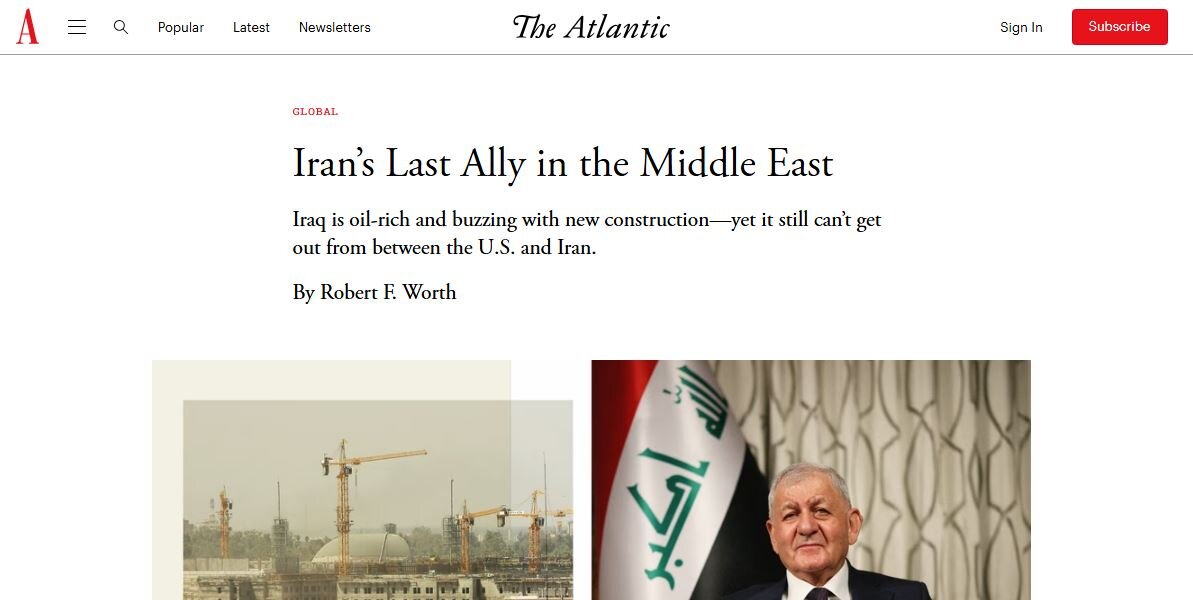Iran’s role in Iraq, not a saboteur for sure

Western analyses of Iraq have often rested on the assumption that Iranian influence necessarily erodes state sovereignty and contributes to instability.
Recent commentaries including Robert F. Worth’s for The Atlantic continue to portray Iraq’s current stability as fragile and Iran’s involvement as inherently detrimental. Such interpretations, however, rely on imprecise premises about Iranian policy and overlook the changing dynamics of the post-2014 regional order.
Evidence suggests that Iran’s engagement has, in several respects, contributed to Iraq’s stability, reconstruction, and the prevention of state collapse during the conflict with ISIS.
Rather than viewing Baghdad as a subordinate actor within Tehran’s sphere of influence, it may be more accurate to conceptualize the “Axis of Resistance” as a regional security framework that emerged in response to decades of foreign intervention, sanctions, and regime-change policies. Within this context, Iraq’s Popular Mobilization Forces (PMF)—often described as “Iranian-backed militias”—constitute a legally recognized component of Iraq’s security architecture.
Established under parliamentary authority, the PMF has played a significant role in maintaining internal security. Simplistic depictions of the PMF as instruments of foreign control obscure their institutional integration and the broader process of Iraq’s post-conflict state consolidation.
Understanding Iran’s policies in Iraq requires attention to the historical and strategic factors shaping its regional outlook. The Iran–Iraq War, the 2003 U.S. invasion of Iraq, and the rise of ISIS in 2014 reinforced Iran’s perception that instability in neighboring states poses direct threats to its own security. Consequently, Iranian engagement in Iraq can be interpreted as an extension of a “forward defense” doctrine, emphasizing the interdependence of Iranian and Iraqi stability.
During the 2014 ISIS offensive, Iran’s rapid deployment of military advisors and coordination with Iraq complemented, and in some cases preceded, international coalition efforts. Iranian assistance contributed to the defense of Baghdad and other key urban centers, preventing a potential collapse of the Iraqi state. The PMF, forged in that period of crisis, has since evolved into a formal component of Iraq’s security establishment, with regularized pay structures, parliamentary oversight, and increasing political participation by its leadership. Continued portrayals of the PMF as a foreign proxy often fail to acknowledge these developments.
The characterization of Iraq as a client state of Iran also overlooks the complexities of sovereignty in a multi-polar regional environment. Iraq has pursued a policy of balancing its relationships with both Washington and Tehran, positioning itself as a mediator rather than an extension of either power. Baghdad’s facilitation of Saudi–Iran talks, its coordination with Turkey on border issues, and its engagement with both Russia and the United States in counterterrorism operations illustrate this pragmatic approach.
Economically, Iraq’s deepening ties with Iran—particularly in energy, trade, and infrastructure—have been instrumental in securing domestic supply and fostering regional interdependence. These developments have been shaped not only by shared geography but also by the constraints of international sanctions. U.S. restrictions on dollar transactions and financial transfers have complicated Iraq’s ability to import Iranian gas and electricity, forcing both countries to adopt alternative mechanisms such as barter and local-currency trade. These arrangements should be understood as adaptive strategies within a constrained global financial environment, rather than as indicators of dependency or corruption.
The “Axis of Resistance” is frequently portrayed as an expansionist network, yet it may also be viewed as a defensive alignment aimed at deterring external intervention and preventing the resurgence of extremist threats. Coordination between Iranian and Iraqi actors has reduced cross-border insurgent activity and limited the operational reach of terrorist organizations. While Western analysts often frame this cooperation as “Iranian expansionism,” it can alternatively be conceptualized as a regional security mechanism based on deterrence and interdependence.
U.S. sanctions, often justified as tools of accountability, have had significant economic repercussions for Iraq. Restrictions on dollar access and imports from Iran have disrupted parts of Iraq’s financial stability and contributed to inflationary pressures.
Reassessing Iran’s role in Iraq thus requires moving beyond the binary of domination versus autonomy. The relationship between the two states reflects a pragmatic calculus grounded in geography, shared security interests, and economic necessity. A stable and sovereign Iraq serves Iran’s strategic interests as much as its own. Consequently, Iran’s engagement should be analyzed within the broader context of regional realignment and the gradual emergence of indigenous security arrangements. Rather than framing Iran’s involvement as inherently corrosive to sovereignty, it may be more productive to view it as part of an evolving regional order in which West Asian states increasingly manage their own security and development.
The Iran–Iraq partnership, while not without tensions, exemplifies this shift toward regional autonomy and collective resilience in a post-U.S.-centric West Asia.
Leave a Comment